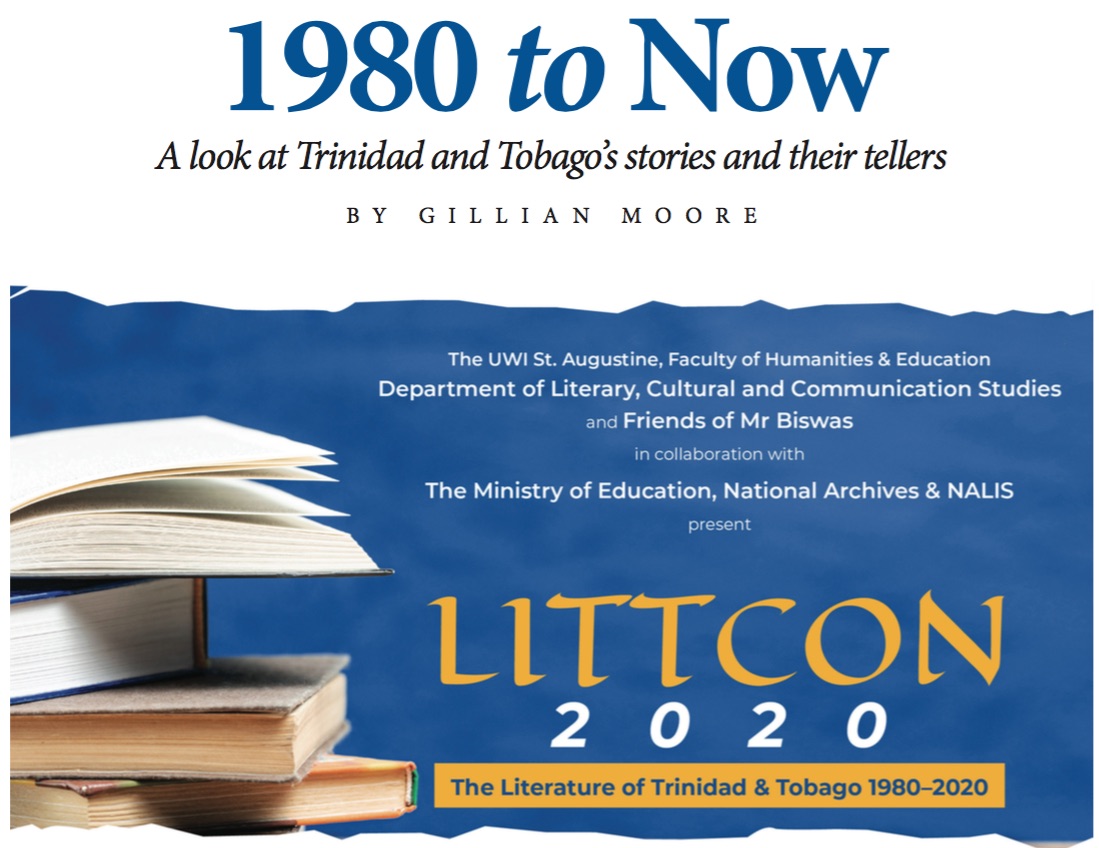
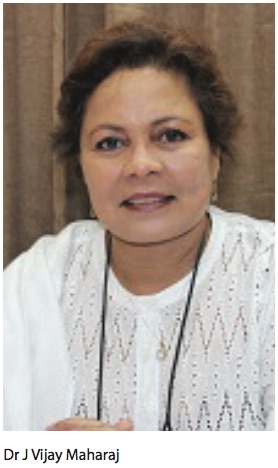
With four full days of readings and discussions about local literature, UWI's “LITTCON 2020: The Literature of Trinidad and Tobago, 1980 to 2020” was “not only about presentations”, but “about deliberations”, and “the gathering of data”. Conference founder Dr J Vijay Maharaj said in her welcome that she hoped the information collected would help to “answer questions that are very pressing in our moment”.
The Department of Literary, Cultural and Communication Studies (DLCCS) hosted the international literary conference, from September 21 to 24, via Zoom, with a broad assortment of offerings and topics for talk, centring on the literary arts.
Senior DLCCS lecturer Dr Paula Morgan argued that the nation's "pre- and post-millennial literary resurgence had been “as pivotal as the movements that predated the emergence of the islands of the Caribbean into nation statehood”, cementing our collective sense of self.
She said our literature showed that "external forces had been insufficient to extinguish the yearning for home”, adding that “notions of home and belonging remain constant and are taking an unexpected primacy in this time”. She said LITTCON 2020 would seek to “calibrate the strength of this umbilical connection, and tell us why”.
The conference was staged in partnership with the National Archives of Trinidad and Tobago, Friends of Mr Biswas, NALIS and the Ministry of Education, and aimed to put the spotlight on Trinidad and Tobago's literature and “to demonstrate the urgent need to expose the nation and the nation’s children to the valuable store available to them”.
Across the four days of discussions, various panels went live on the popular streaming service to take on creative issues. Writers from various genres and with varying levels of renown read from their works. Educators, teacher trainers and curriculum shapers weighed in on local literature and exam curricula. Professionals from related fields like poetry, music, cinema and theatre shared their perspectives in terms of adapting written offerings for stage and screen. Academics, researchers, and journalists examined the literary landscape. Open house sessions also gave writers a chance to read excerpts from their works in a more informal setting.
The seminar kicked off with words of welcome by Dr Maharaj, and collaborators including UWI St Augustine Principal Professor Brian Copeland and Friends of Mr Biswas Chairman Professor Kenneth Ramchand. Minister of Education, Dr Nyan Gadsby-Dolly, sent her feature address along with a pre-recorded reading from one of her favourite local books, Nyabo (Madam) - Why Are You Here? The Truth about Living in Service, Love, and Personal Power Quotes, by Akosua Dardaine Edwards.
Monday's schedule brought out some heavy lit hitters. Panels featured readings and chats with popular T&T writers like Barbara Jenkins, Monique Roffey, Danielle Boodoo-Fortune, Andre Bagoo and Ingrid Persaud. They looked at the process of writing a first novel, their motivations and inspirations, and facing the challenge of conveying their creative vision.
Later in the day, writer and journalist BC Pires moderated a conversation entitled “Centrifugal to the Literature”, featuring Emeritus Professor, author, researcher and filmmaker Patricia Mohammed; animator and educator Camille Selvon Abrahams; filmmaker Michael Mooleedhar and directors Danielle Dieffenthaller and Mervyn de Goeas.
Dieffenthaller and de Goeas, collaborators on the popular local soap opera Westwood Park (1997–2004) discussed the dialogue-writing and storytelling choices they made while creating the show, at times taking inspiration from actual news stories for a more realistic feel.Selvon Abrahams spoke about her goal of representing Caribbean people in animation, especially against a mainstream international context which often portrays black and brown people as “other”.
Mohammed discussed the challenges of reworking cherished Caribbean literary works for film, referencing some that have already been made and proposing others that she felt were promising candidates for adaptation.
Day One offerings also included a panel on literature for young people with authors Jeanelle Frontin, Danielle YC McClean, Lisa Allen-Agostini and Summer Edward; and a talk about oral and performance literature with poet Derron Sandy, rapso artists Wendell Manwarren and Brother Resistance, performance artist Sat Balkaransingh, and Chutney performers Tina Ramnarine and Timothy Bally.
Tuesday’s panels included discussions of postcolonial trauma in Caribbean literature, creative nonfiction, poetry and popular culture.
There was also a discussion about online news reporting within the socially-distant Covid-19 paradigm, featuring veteran journalists Sheila Rampersad, Judy Raymond, Lasana Liburd, Ira Mathur and Mark Lyndersay, with Liburd and Lyndersay calling for more coverage for sports and the arts. Lyndersay said art reviewing needed greater focus: “if we don’t evaluate our work from our own perspective ... we end up waiting for someone else” to affirm our cultural offerings.
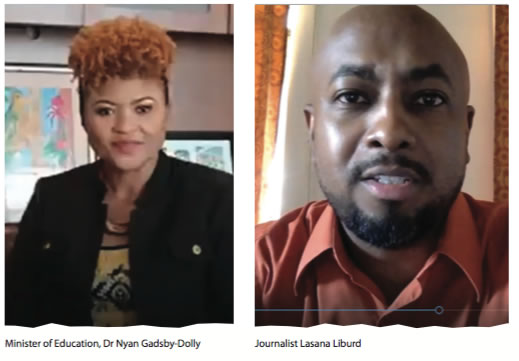
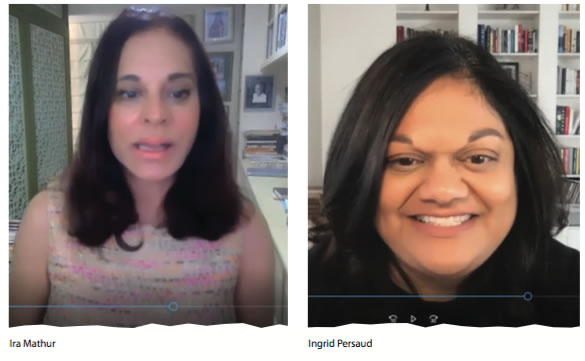
He said the journalist “has a responsibility” to report on art and culture “with authority, style and intelligence,” to challenge readers and encourage them to question and think critically.
Rampersad argued for more investigative journalism that went beyond the headlines. She said mass media was “failing” to reflect the real lives of citizens. Raymond agreed, saying our journalism was losing depth, detail and variety in the face of shorter news cycles. She said the fact that the internet had make it easier to access information did not mean it was easier to get the facts.
Literature in education was the topic of the day on Thursday 24, with teachers, students and education administrators weighing in on academic issues.
Student representatives from Arima Central Secondary School, St George’s College, Lakshmi Girls’ Hindu College, ASJA Girls’ College San Fernando and Fatima College spoke about the enriching effects of studying Literature at school.
During a talk on 21st century poetic developments, featuring teachers Jolie Wong, Maxine Archer, Kenneth Ramchand and Susan Dubay, Dubay said she observed that some students were unable to write in their spoken tongue — non-standard English — and did not possess higher-order analytical skills. She said she had found an integrated approach to teaching poetry was useful in allowing students to “see themselves as poets” and “engage their emotions” in the process.
Curriculum Officers from the Ministry of Education, working in districts across the country, discussed the challenges of monitoring language arts education at primary and secondary schools. Panellists offered their perspectives, based on their experience as former teachers and observing other educators while on school visits.
Another education panel took on teaching literary appreciation. Marin Gonzales, a literature teacher at Malick Secondary School, spoke of the challenges of teaching with limited resources, and working with students who often felt disenfranchised in the school system. He said it was important to keep their interest by “staying abreast of what they are into,” including music and cultural trends.
Closing the day’s session, spoken word poets Derron Sandy, Abdul Majeed Abdal Karim, Camryn Bruno and Marcus Millette engaged in a friendly poetry slam.
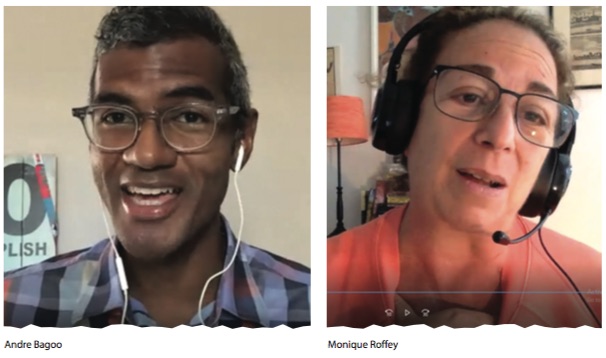
On the final day, viewers were taken on a “verbal literary tour from San Fernando to Mayaro”, while exploring “the Michael Anthony Landscape”, led by Roydon Salick, Brinsley Samaroo and Ken Ramchand. They analysed the geography of his The Year in San Fernando and Green Days by the River.
Director Michael Mooleedhar returned to discuss his award-winning film adaptation of Anthony's Green Days. He showed clips from the movie, while describing his storytelling aims, directorial choices and logistical challenges, also giving some behind-the-scenes background.
Author Teresa White read excerpts from Ian McDonald’s The Humming-Bird Tree, alongside clips from the film version, exploring the challenges of translating books to the screen. She showed gaps between the novel’s portrayals and the movie, which she said did not ultimately capture societal nuances or the characters’ “deep introspection,” and seemed geared toward a foreign audience.
The conference ended with the organisers’ vote of thanks, leaving viewers and participants with a wealth of ideas and insight to ruminate on.